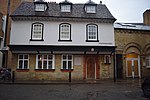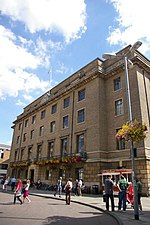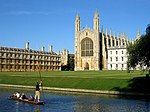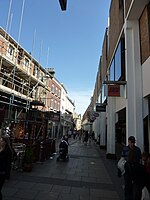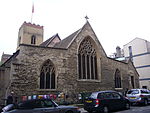Guildhall Street, Cambridge

Guildhall Street is a street in central Cambridge, England. To the north is the southeast corner of Market Hill at the junction with the pedestrianised shopping street Petty Cury. To the south it continues as Guildhall Place, a cul-de-sac, at the junction with Wheeler Street, close to the northern end of Corn Exchange Street. To the west is the Cambridge Guildhall, hence the name of the street. To the east is the Lion Yard shopping centre. Fisher House in Guildhall Street is a Grade II listed late 16th / early 17th century timber-framed building that houses the Cambridge University Catholic Chaplaincy. The Red Cow public house is also Grade II listed, built in 1898 in a Jacobethan style. There is an outdoor sculpture, Talos, by Michael Ayrton in c. 1960, installed in Guildhall Street around 1973.
Excerpt from the Wikipedia article Guildhall Street, Cambridge (License: CC BY-SA 3.0, Authors, Images).Guildhall Street, Cambridge
Guildhall Street, Cambridge Newnham
Geographical coordinates (GPS) Address Nearby Places Show on map
Geographical coordinates (GPS)
| Latitude | Longitude |
|---|---|
| N 52.20483 ° | E 0.11972 ° |
Address
Guildhall Street
CB2 3NH Cambridge, Newnham
England, United Kingdom
Open on Google Maps
